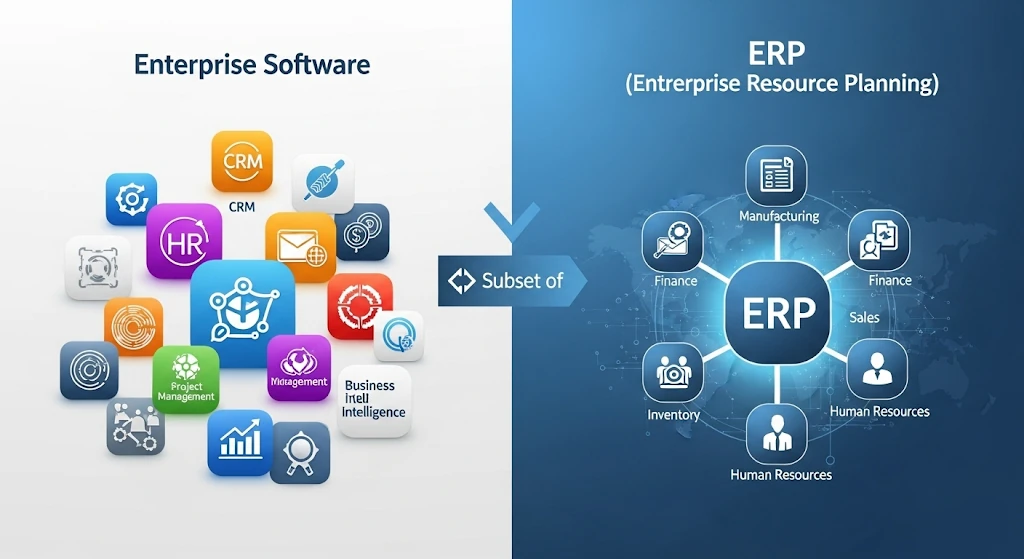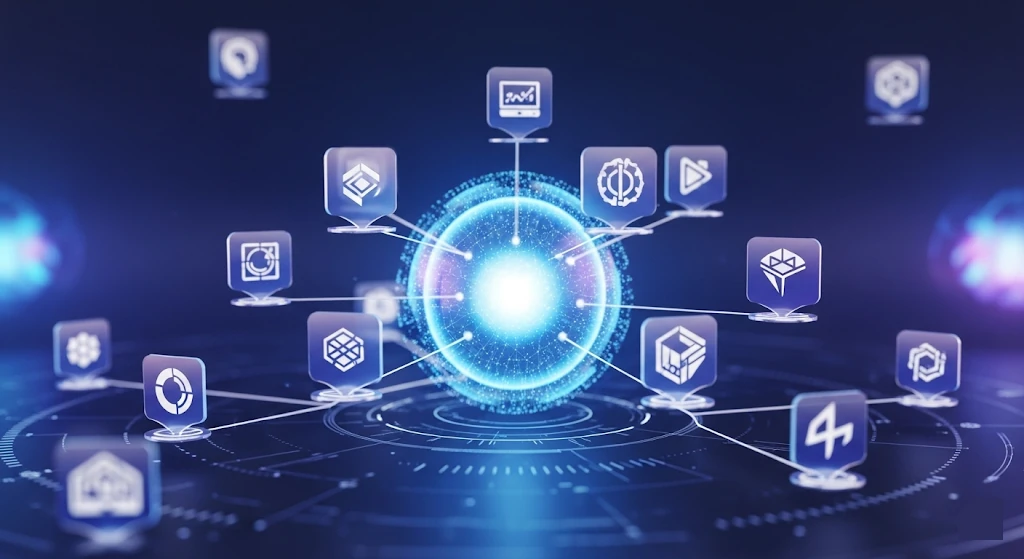If we discuss today’s world, we use terms like Enterprise Software and ERP (Enterprise Resource Planning) that often revolve around a lot. You always hear or see that people use interchangeable things, especially in official business meetings, technology discussions, or when they are doing or generating digital platforms.

But at this time, are they really the same thing?
We used to say NOT exactly because, we say that just like every square is a rectangle, but not every rectangle is a square, ERP is sometimes a type of enterprise software, but enterprise software is much larger or bigger than ERP alone.
In this article or blog, we’ll break things down or separate in the form of the simplest way possible. The use of no jargon. No unnecessary tech talk. We discuss the clear explanation of these terms, how these things are different from each other, how they overlap, combine or collaborate, and why it matters to us, especially while you are running, speeding or growing your new business.
What Is Enterprise Software?
You are just imagining that your enterprise software is a huge umbrella that covers or supports various or numerous kinds of software solutions with huge designs to help businesses run or speed smoothly.
These tools are built or provided not for individuals, but for business runners, organizations, from small startups to large industries or enterprises.
Key Features of Enterprise Software:
- This enterprise is designed for multiple users across departments or states
- Focuses on availability and scalability (can grow with your business)
- Helps with data management, automation, and collaboration and software designed
- Offers customization for specific business needs
Examples of Enterprise Software:
- Customer Relationship Management (CRM) – like Salesforce or Zoho CRM, it looks like a manager and customer built in relationship
- Supply Chain Management (SCM) – like Oracle SCM Cloud, these things are used in enterprises.
- Business Intelligence (BI) – like Power BI or Tableau, used for large-scale business.
- Enterprise Content Management (ECM) – like SharePoint, sharing all kinds of resources
- Human Resource Management Systems (HRMS) – like Workday or BambooHR it handle the overall functioning of the organization
- And yes—ERP is one of them! It looks like it is one of them.
So, as you can see, ERP is just one piece of the big puzzle that makes or runs up enterprise software.

What Is ERP? (The Central Brain of Business Operations)
Now let’s move to another thing that zooms in on ERP, which stands out for Enterprise Resource Planning. ERP is like the central nervous system of a company or any organization.
It helps to stand out with different parts of a business or organization, from finance to the HR department to the supply chain or to convert—all work together on one platform. So, instead of each department working on its software (which can create a mess), ERP brings everyone onto the same page. And using the equal HR of any organization or company.
Main Functions of an ERP System:
- Finance & Accounting: Managing budgets, invoices, payroll, or a company’s budget and overall working.
- Inventory Management: Tracking stock and supply needs for any organization.
- Procurement: Purchasing and vendor tracking, and used their tracking system for any organization.
- Human Resources: Employee information, leave, payroll and providing their monthly incomes.
- Manufacturing: Scheduling and production planning, and wanted to run or grow a new business strategy.
- Sales & CRM: Customer orders and sales forecasts are provided with full customer service.
The magic of ERP is integration. It keeps data flowing smoothly between departments of any other company in real-time. And provide real-time situations smoothly.
So, Is Enterprise Software the Same as ERP?
Simply, we say that: No.
We used to say that ERP is just one kind of enterprise software in a company or organization. Think of it seems or like this:
| Term | Meaning |
| Enterprise Software | A broad category that includes all software designed for business use. |
| ERP Software | A specific type of ERP software that is used for business processing.. |
So, we are saying that we are investing ourselves in enterprises for enterprise software and companies.
Real-Life Example: Imagine a Company Called “FreshBite Foods”
We’ll tell you a clearer story with a small one.
Scenario:
FreshBite Foods is a growing food company that makes and delivers healthy meals and healthy diets to its customers or clients.
- They use Salesforce (CRM) to manage their customers and their goods orders.
- They use QuickBooks (Accounting) for their finances.
- They use Trello for project management and their enterprise management.
- But… These tools don’t talk to each other because of their absurdity.
Result? They’re wasting time manually updating spreadsheets, copying data, and fixing errors.
So, they switch to an ERP system like SAP Business One.
Now:
- When sales close a deal, finance sees it automatically.
- Inventory updates in real-time when orders come in.
- HR can track employees, payroll, and leaves from the same platform.
That’s the power of ERP.
But notice—they had enterprise software before. They just didn’t have it all in one place. ERP solved that.
Why Do People Confuse the Two Terms?
Good question. Here’s why:
1. They’re Often Sold Together
Vendors often bundle ERP systems with other enterprise software tools, making it seem like they’re the same.
2. ERP Covers a Lot
Since ERP includes many modules (HR, Finance, Inventory, etc.), people assume it’s the only thing businesses need.
3. Marketing Language
Let’s be real, tech marketing can blur definitions. Words like “enterprise solution,” “platform,” “suite,” or “cloud business tools” get mixed up fast.
Pros and Cons of ERP vs Other Enterprise Software
| Feature | ERP | Other Enterprise Software |
| Integration | High – connects many functions | Usually handles one function |
| Customization | Can be customized, but complex | Often easier to customize |
| Implementation Time | Long | Varies (shorter for smaller tools) |
| Cost | Usually high upfront | It may be cheaper if modular |
| Flexibility | Great for all-in-one needs | Great for a best-of-breed approach |
When Should a Company Choose ERP Over Separate Tools?
Here are signs your company might be ready for ERP:
- Your departments don’t communicate well.
- You’re using multiple tools that don’t sync.
- You want to scale without adding chaos.
- You need real-time reporting from multiple areas.
But if you’re just starting out or only need specific functions (like sales tracking or payroll), a stand-alone enterprise app might do the job for now.
Popular ERP Systems to Explore
If you’re curious about ERP options, here are some of the most well-known:
- SAP
- https://www.sap.com/products/erp.html
- Oracle ERP Cloud
- Microsoft Dynamics 365
- NetSuite (by Oracle)
- Odoo ( that is mostly used forOpen-source ERP)
These platforms offer and provide different kinds of software applications.
Conclusion:
Let’s discuss these enterprises in a certain and simple way.
- Enterprise software is a big category of tools made for businesses and business strategies and organization tools.
- ERP is a type of enterprise software that helps your business process together.
- They are related to each other—but not the same.
- ERP is great for integration, but it may not be needed by every company, especially smaller ones and are used for small enterprises.
- Choosing between ERP and other enterprise tools depends on your budget, business size, and goals that you may need in your own business organization.
Whether you’re running a startup or managing an IT business for a large company, knowing the difference can help you make smarter software decisions for business processing.
FAQs
1: Are ERP and enterprise software the same thing?
Not really. ERP is a type of enterprise software. Think of ERP as one big software that connects many business functions. Enterprise software includes ERP and other tools, too.
2: Do small businesses need ERP?
Not always. If you’re a small business using a few simple tools and they work fine, that’s okay. ERP is more useful when your business grows and things start getting messy or disconnected.
3: Why do people get confused between the two?
Because ERP does a lot of things, people think it covers everything. Also, tech companies sometimes mix up the words in their ads or websites.
4. Are cloud-based ERP systems better than others?
For many businesses, cloud ERP systems are mostly cost-effective and scalable, and easier to maintain. But for companies needing deep customization or data control, on-premise ERP might be better than your small enterprise.
5. What’s a good free ERP option for any organization?
You must try Odoo (https://www.odoo.com/) for an open-source ERP that is flexible and most affordable for startups and small businesses of any organization.
6. Should I buy ERP if I already have accounting software and CRM?
Maybe not the same for each other. And it’s actually accounting your software and CRM .
Final Words:
Here we provide you the clear and the fastest response of ERP.
You Don’t follow these trends but—follow what your team always needs for the latest changes.
And do remember the one thing that these trends make your life easier.
